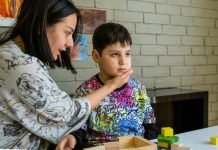
Cold Spring Harbor Laboratory (CSHL) researchers have uncovered new insights into the genetics of autism spectrum disorder (ASD), challenging previous beliefs about parental genetic contributions.
ASD covers a range of neurological and developmental conditions affecting communication, socialization, learning, and behavior.
Previous Beliefs and New Discoveries
It was long assumed that siblings with ASD share more of their mother’s genome than their father’s.
However, CSHL Associate Professor Ivan Iossifov and Professor Michael Wigler have discovered that in many cases, the father’s genome may play a larger genetic role.
Over the last two decades, CSHL scientists have been involved in a major effort to identify the genetic origins of autism. They discovered thousands of genes that, when mutated, may cause a child to be born with ASD.
But these findings were unable to account for all ASD cases, prompting Iossifov and Wigler to search for other potential sources.
Study Methodology and Findings
The researchers analyzed the genomes of over 6,000 volunteer families. They found that in families with two or more children with ASD, the siblings shared more of their father’s genome.
On the contrary, in families where only one sibling had ASD, the children shared less of their father’s genome.
This finding uncovers a new potential source of ASD and poses the question of whether other disorders might follow similar genetic patterns.
Theories and Future Research
The exact mechanism by which the father’s genome influences children with ASD remains unknown. However, Iossifov proposes two theories.
Some fathers may carry protective mutations that are not passed on, or fathers may transmit mutations that trigger the mother’s immune system to attack the developing embryo.
“If one of those theories or two of them prove to be true, then it opens different treatment strategies, which can, in the future, affect quite a lot of families,” says Iossifov.
Implications
This research may offer valuable insights for educators and therapists, allowing for earlier diagnoses and a better overall understanding of autism.
If you care about autism, please read studies about a new cause of autism, and vitamin D could help lower the risk of autoimmune diseases.
For more information about health, please see recent studies about vitamin D that may hold the clue to more autism, and gut health plays a role in autism.
The research findings have been published in the journal Cell Genomics.
Copyright © 2023 Knowridge Science Report. All rights reserved.



